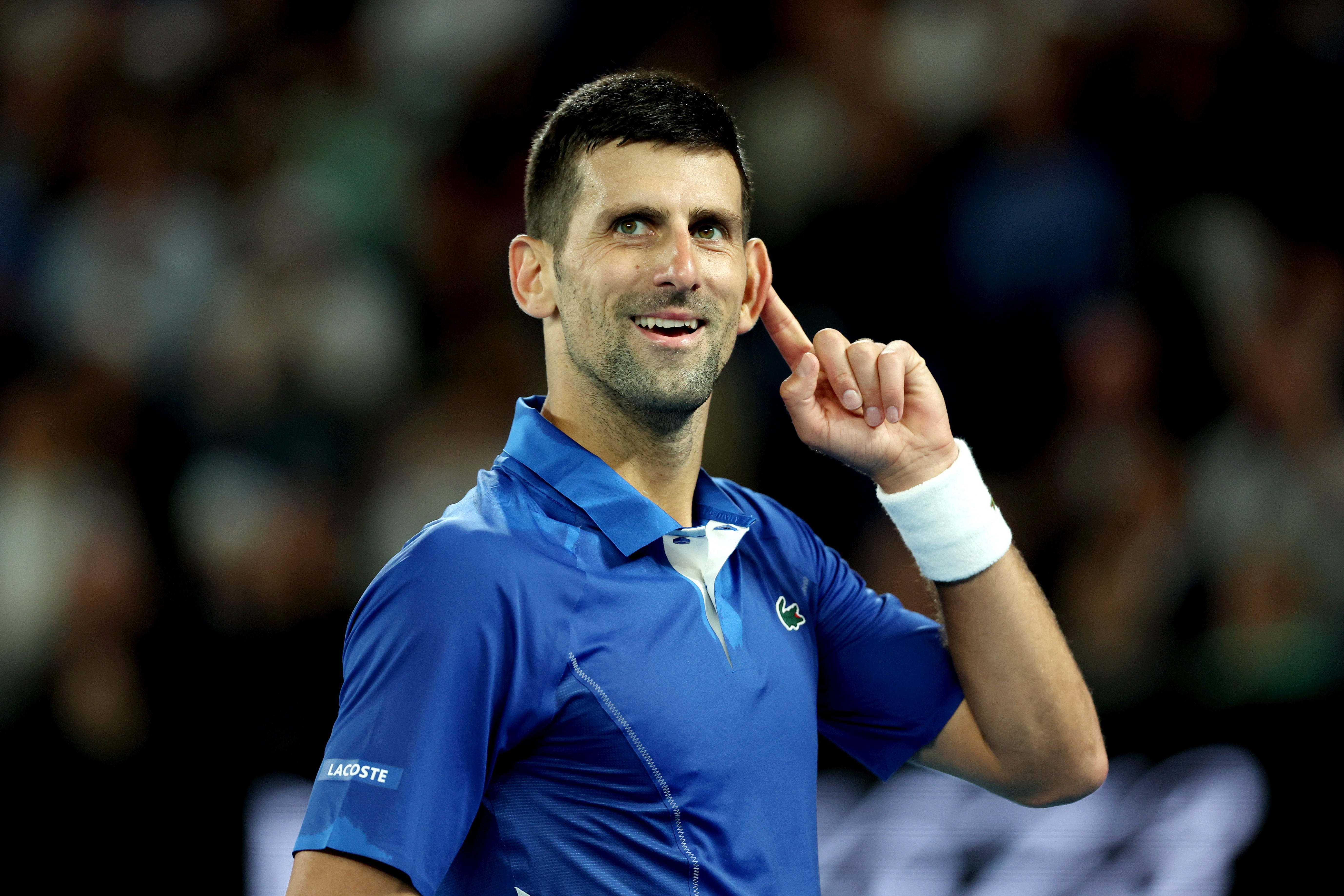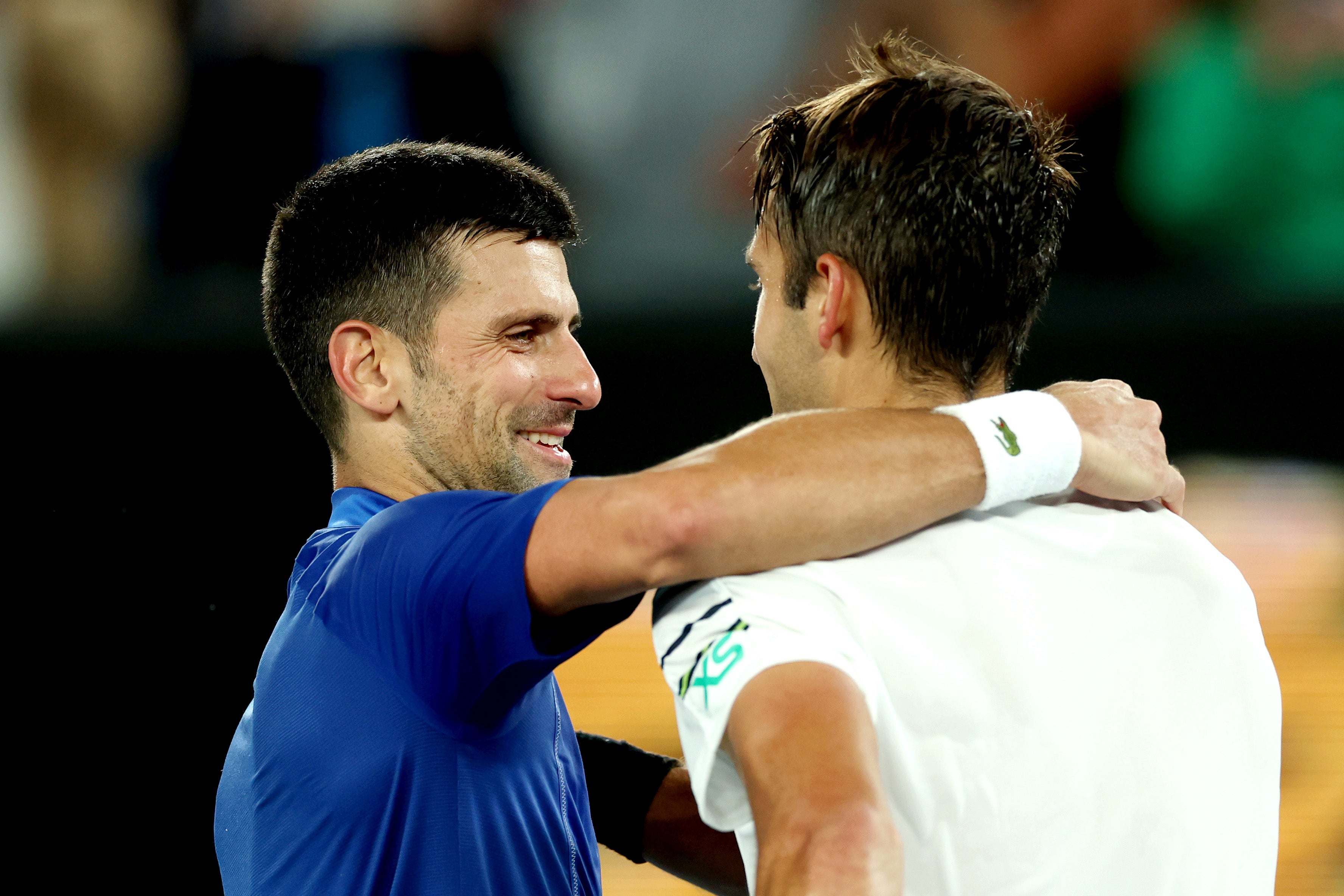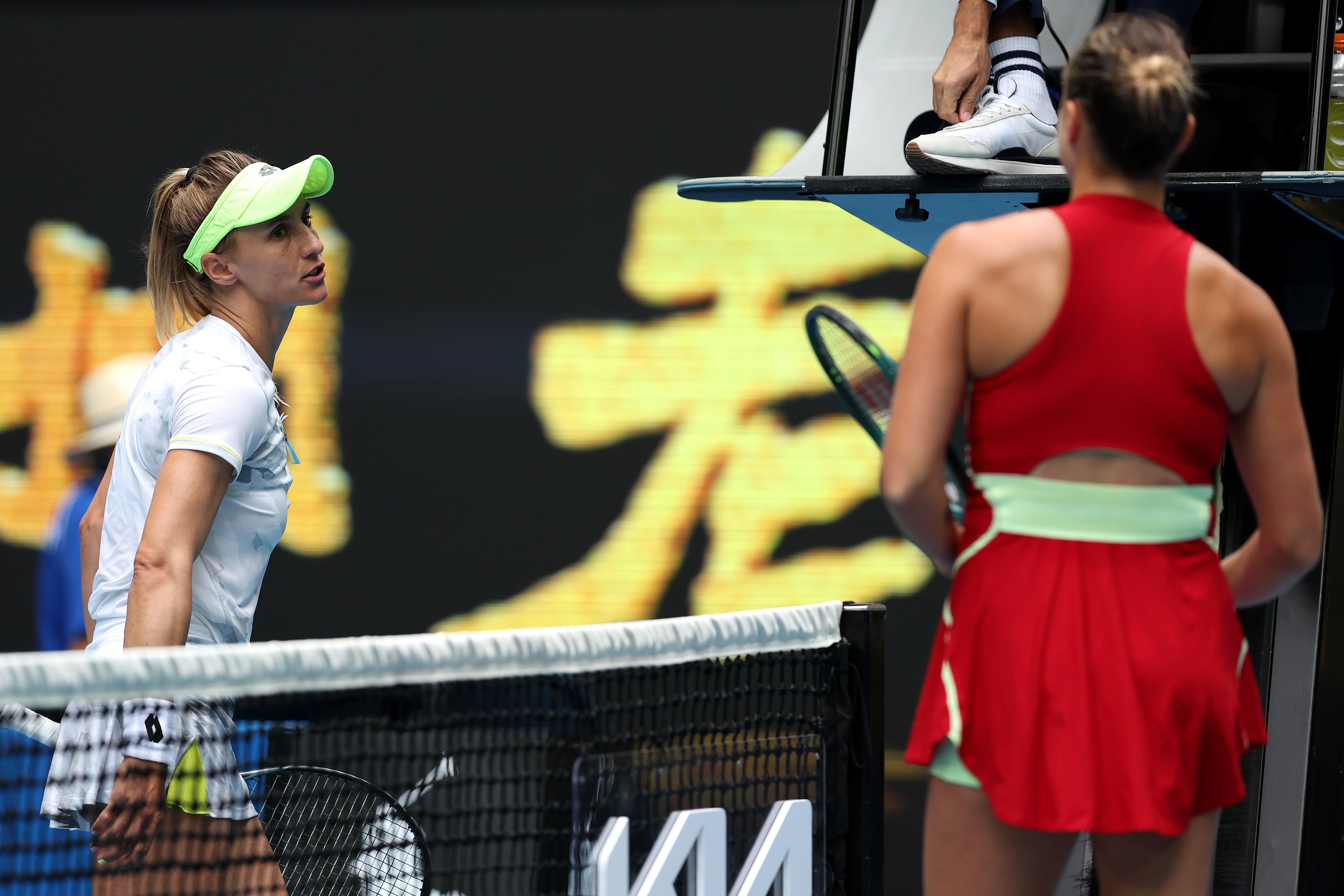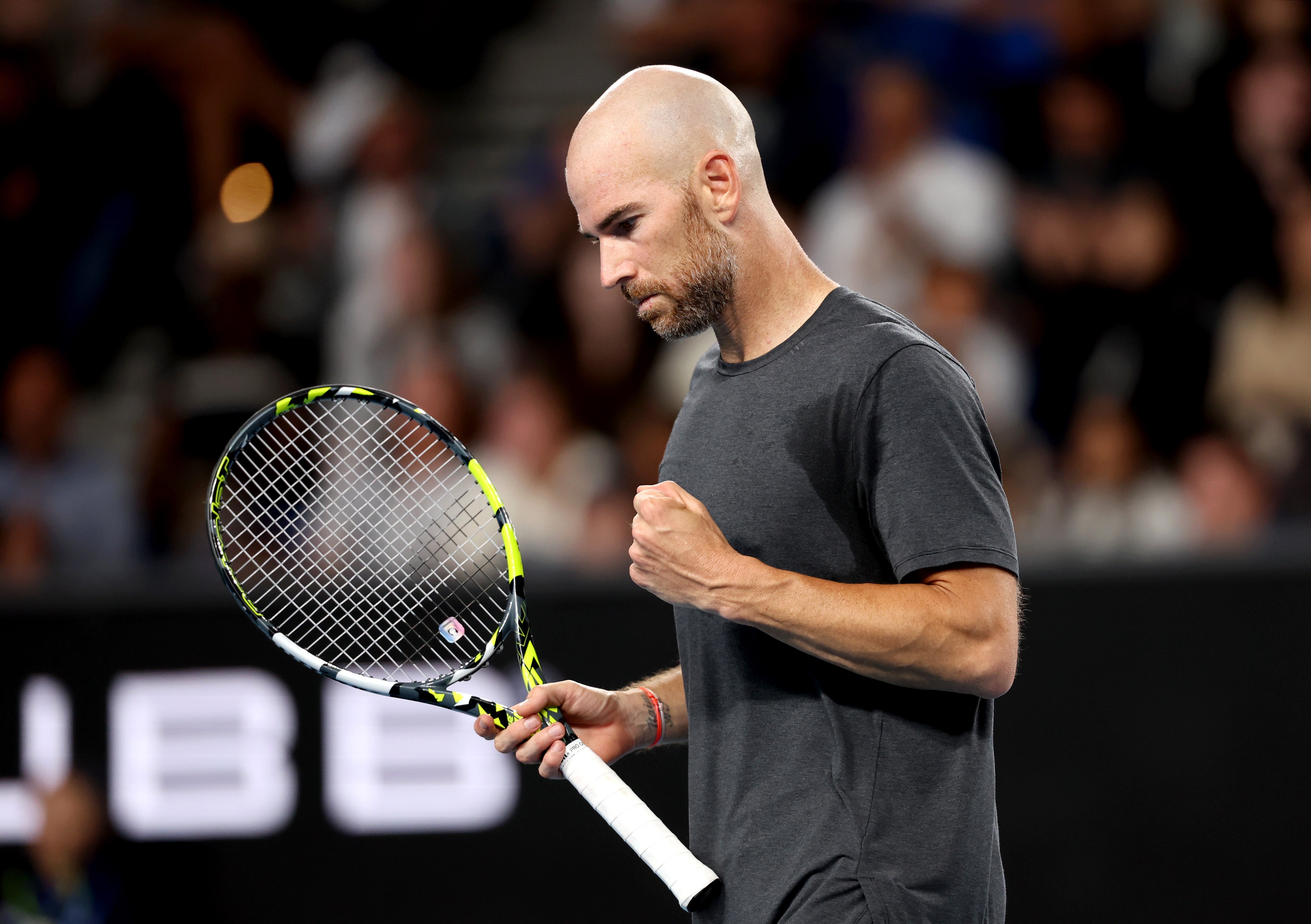Novak Djokovic finally finds his groove at Australian Open – the rest of the field will be trembling
The 10-time winner in Australia produced his best performance of the tournament so far in beating Tomas Etcheverry on Friday
For Novak Djokovic, that’s quite enough drama for week one. Usually so serene and at ease in the opening seven days of a Grand Slam, the 10-time Australian Open champion has teetered on the edge of an early shock so far in Melbourne.
Four sets in his opener against Croatian qualifier Dino Prizmic and four sets against home hero Alex Popyrin in the second round, when he was extremely fortunate not to be a set away from elimination.
No such concerns in the last 32, however. Argentinian 30th seed Tomas Etcheverry had seen off elder statesmen of the tour in Andy Murray and Gael Monfils to set up a night-time encounter under the Friday lights. But the epitome of top-tier longevity in men’s tennis produced a statement straight-sets victory, 6-3, 6-3, 7-6 (2). A statement which said to the rest of the field: business as usual.

The Serb knew it himself, too. “That’s the best performance I’ve had in this tournament. He stepped it up and raised his level in the third set, we went toe to toe but I found the right shots in the tie-break.”
And here’s the thing: Etcheverry did not play badly. A first-serve percentage of 72 per cent. Thirteen aces compared to Djokovic’s 10. And six fewer unforced errors – 29 – than his opponent. But throughout the back and forth over two and a half hours, Djokovic did not face a single break point. In fact, he was only in a losing position on his serve in three games.
The Argentine – with his heavy groundstrokes and quick movement but, crucially, a lack of variety – essentially played Djokovic back into his groove at Melbourne Park. Play Djokovic at his own game and you are fighting an inevitable losing battle.
One break in the first set, two in the second, was enough for Djokovic to take control of this match. Credit to Etcheverry in the final set, who played his part in some mesmeric points. But come the tie-break, as he said himself, Djokovic had all the answers at the right time.

The Serb next up faces the unorthodox but extremely effective Adrian Mannarino in the fourth round on Sunday after the Frenchman beat Ben Shelton for his third five-set victory in a row, thus scuppering hopes of a Djokovic-Shelton rematch after their entertaining clash in the semi-finals of the US Open last summer.
Beyond that could come the proper tests: Stefanos Tsitsipas and Jannik Sinner are the danger men in his half of the draw, following decisive straight-set victories on Friday. Sinner particularly, given he got the better of Djokovic twice in two weeks at the back end of the 2023 season, in the ATP Finals and Davis Cup Finals.
Still, over best-of-five on his favourite court, Djokovic is hitting his groove rather nicely now ahead of his favourite seven days of the year: week two at the Australian Open. The rest of the field will be trembling.
Tsurenko reminds tennis community of war in Ukraine after defeat
In the women’s singles on Friday, defending champion Aryna Sabalenka cruised through to the fourth round with a double-bagel victory over Ukraine’s Lesia Tsurenko – but it was not the decisive 6-0, 6-0 score-line that made the headlines post-match.
At the end of the match, there was no handshake, as has been standard between Ukrainian players and those from Russia and Belarus since the start of the war nearly two years ago, although the pair did both put their hands up to acknowledge each other.

“It’s very hard for me,” Tsurenko told reporters about going up against Russian and Belarusian players.
“I know where they’re from, this is another reminder for me and it’s painful,” she said. “They’re part of that ... war machine hurting my country and my people. This is tough for me but I’m trying to find happiness in everything that I do and go and hit the yellow ball.”
Last year in Melbourne, the tournament held a prominent fundraiser for Ukraine but the war has slipped down the tennis agenda, as Tsurenko feels it has in society generally.
“People don’t want to talk about war, people don’t want to hear bad news,” she said. “I get a lot of bad messages on social media that people are kind of annoyed if I post something.
“It seems like the whole world is tired of hearing that but unfortunately, it’s still going on, it’s a part of my life and part of other Ukrainians’ life and we have to talk about it, we have to remind people about Ukraine.”
Elsewhere in the women’s draw, US Open champion Coco Gauff was a comfortable 6-0, 6-2 winner against American compatriot Alycia Parks, while 16-year-old Mirra Andreeva’s fairytale run continued with a final-set tiebreak victory, 1-6, 6-1, 7-6 (10-5), over Diane Parry.
Andy Murray came out in defence of Andreeva on Twitter/X after the match, criticising the commentator who questioned the teenager’s mental strength.
However, Australian Storm Hunter could not make the second week in Melbourne, losing 4-6, 7-5, 6-3 to ninth seed Barbora Krejcikova.

On the men’s side, Sinner and Tsitsipas were comfortable straight-set winners over Sebastian Baez and Luca Van Assche respectively, while Australian 10th seed Alex de Minaur set up an intriguing fourth-round match with fifth seed Andrey Rublev, who came through against Sebastian Korda.
The match of the day, however, was Mannarino’s win against Shelton – which came after a swashbuckling four hours and 46 minutes of play between the two left-handers on the Kia Arena. Shelton looked close to victory up two sets to one before Mannarino’s experience came to the fore as the match progressed, coming through 7-6 (4), 1-6, 6-7 (2), 6-3, 6-4.
On Saturday in Melbourne, Carlos Alcaraz and Iga Swiatek are in third-round action while Britain’s last remaining singles hope, 19th seed Cameron Norrie, takes on 11th seed Casper Ruud at around 6am (GMT) on the John Cain Arena.
Join our commenting forum
Join thought-provoking conversations, follow other Independent readers and see their replies
Comments
Bookmark popover
Removed from bookmarks